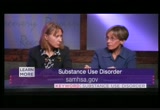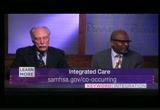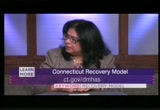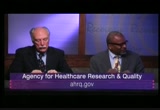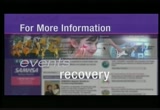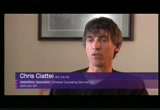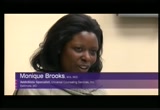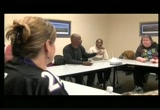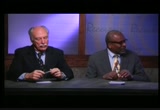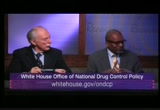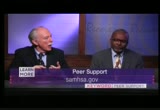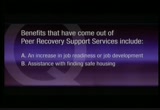tv [untitled] October 25, 2012 8:00am-8:30am PDT
8:00 am
excluding the individuals who had the two problems. and so, most recently-meaning the last two or three decades- integrated treatment has been recommended. it's been implemented. it's been-it's been evaluated as well. and when you think about it, it makes an enormous amount of sense, because, as professionals, whether it's researchers or clinicians, we have the luxury of looking at the mental health or the substance use disorder, but the affected individual is one person wrestling with both at the same time, and both of these problems are dynamically associated, if you will, so that the improvement in one area will effect improvement or deterioration in the other area. the other thing i would add is that for people with both a mental health issue and a substance use disorder, as you said, in the past, they were treated kind of separately.
8:01 am
this one. this one. there was kind of some argument about, well, which came first? we need to address the substance abuse issue before we can make headway on the mental health issue. on the flip side, the mental health practitioners would say, no, we need to address the depression or what have you before we can really make headway on the substance use. and i think what people are really beginning to understand, especially in the last decade, that they have to be treated at the same time and not just treated at the same time in parallel, but treated at the same time in a very integrated fashion. if you google dual disorder, you will see hypertension and diabetes, but you never hear problems in treating those two disorders. i think the reason is doctors, nurses, pharmacists are educated in both, and, very importantly, the money comes out of the same pot. so, so often there's a separate pot for mental health money and
8:02 am
substance abuse money, and it has produced an unnecessary, really divisive conflict in the education and in the delivery of people. yes, and all the way down to the community level where there are demonstration projects to use evidence-based practices in substance abuse or in mental health disorders. communities get funding from the federal government to do these demonstration projects, but the funds have been-in the past, at least-siloed, so that they could only address one or the other at the same time. i think one of the reasons that the demonstration grants have been separate is because, indeed, the insurance financing has also been separate, and it's an important thing to keep in mind. there's also another issue that we also have to keep in mind that we're addressing with our screening brief intervention referral and treatment. while it is true that the issue co-occurring is the expectation,
8:03 am
not the exception, for those who present the treatment, the majority of the people who have substance abuse problems or mental health problems don't present for treatment. so 95 percent of the 20 million people who meet criteria for substance abuse perceive no need for treatment. in other words, they're not in the treatment setting. so, if we look at integrated treatment, we're looking at people who tend to have more co-occurring, because a larger group of individuals actually don't meet criteria for co-occurring. and so as we approach the treatment of both mental health issues and addiction issues, we have to look at the whole universe and we have to strategize how we're going to deal with that larger universe because we're not going to make the problem of substance abuse disorder go away. and then, the final thing is that there are also community-based issues that are tied to substance abuse disorders that are not true for mental health disorders-criminal justice issues, child welfare issues, which are much more
8:04 am
powerful in the addiction arena than in the mental health arena. so, that creates a demand for an alternative pathway, which, from a clinical point of view, is not terribly effective, but that demand is codified, if you will, at the community level. and, we have examples, however, of states that have, indeed, approached the subject in a very novel way, such as connecticut. shall we talk a little bit about what thomas kirk did and how he was able to bring together-or attempt to bring together the two fields? well, that is happening, and samhsa is endorsing that. but we also have to step back and look at the larger environment, and that is making sure that whoever presents for whatever problem gets those problems addressed, and making sure that we expand the reach of our intervention, so that we're dealing with people at various stages of the problem. if we only wait until individuals' problems are so severe that they have to engage in treatment, they tend to be more complicated.
8:05 am
they cost more, and the interventions tend to be more complicated. yeah. so, the whole notion of how you best address this issue is dependent not only on demonstration grants that organizations like samhsa would pursue but also the research that the nih would pursue and some of the services' strategies that ahrq, the agency for healthcare research and quality, would pursue. so, we all operate together so that we produce the outcomes at the largest society as well as the individual. the real challenge is certainly with the individual who seeks treatment and where he or she presents, but there's also a whole host of issues in terms of policy, and you yourself, i've just noted, funding streams that really also-right, tom? that also need to be addressed. we talk a lot about evidence- based clinical practices. there's certainly a need for them. there's also a crying need for evidence-based policies,
8:06 am
policies that take advantage of what we know now that we didn't know 40 years ago when many state and even federal policies were written. insurance is different. the state of the science is different. the population is different, and that's a place that's going to set the occasion for the kind of array of quality services that people deserve. and, dr. laudet, it's even more challenging, as we are seeing changes in the healthcare reform system and how that's going to play out in terms of how recovery services, in particular, are going to be offered. can you speak a little bit about that? i actually see an enormous amount of promise from the standpoint of delivery recovery support services in the context of healthcare reform as it's written right now, because-well, there's a number of reasons. of course, there's parity and there's also the fact that,
8:07 am
according to numbers, of the 32 new million people we'll be ensured 6 or 10 million of them have a behavioral health-either substance use or mental health problem, so that's one part. but when you look at, in addition to that, several of the key points of healthcare reform are extremely consistent with the recovery-oriented systems of care goals and model that dr. clark and samhsa have been embracing and promoting for many years at samhsa, for example, screening, early intervention. you have person-centered or patient-centered in healthcare reform. you have integrated care, which for healthcare reform is primary and behavioral healthcare, whereas, in samhsa it's mental health and substance use. and then you have the continuum-of-care model, the chronic-care model, which would, in healthcare reform, be evidenced in the so-called patient integrated care health homes for the people on medicare
8:08 am
with the definition of medicare being enlarged in 2014. and i really think that the way that healthcare reform is presenting as written right now is extremely friendly to the recovery support services model that i believe should be implemented. and really, what's going to be lacking, at least from my perspective, is the science base for the recovery, for the need for recovery support services, because whilst there are a lot of federal agencies-ondcp, of course, the department of education and samhsa-the service level that are pushing for recovery support expansion and calling it recovery has to be research-based. we don't have the funding from the nih. but we have practice-based- we have the-yes, but that's not-you know. so- it's not empirical. it's not empirical yet. okay. we're trying. and, for prevention, dr. peterson,
8:09 am
are there some similarities? yeah. you know, with healthcare reform, one of the things that i'm really looking forward to is the coverage of screening and brief intervention in primary healthcare or other healthcare settings. i think if you think of going to the doctor 50 years ago and you weren't typically routinely screened for high blood pressure, for example. now, it's done routinely. i think the same way of thinking about substance use disorders or mental health disorders in that they are something that can be screened for. if detected early, they can be effectively treated. and if you apply this kind of screening universally, then it is-it's a really good avenue for us to catch
8:10 am
problems early to get people education or brief intervention or refer them to the help that they need. and when we come back, we're going to continue to look at some other methodologies that are current and new and that we need to know about. we'll be right back. for more information on national recovery month, to find out how to get involved, or to locate an event near you, visit the recovery month web site at recoverymonth.gov. i had no idea it was going to be so hard. i didn't know what to expect. you hear the stories, but i never took any of it seriously until i found myself here, and then i realized i was going to have to work hard for my recovery. if you or someone you know has a drug or alcohol problem, you are not alone. call 1-800-662-help.
8:11 am
recovery was the hardest job i ever had, and the most important. brought to you by the u.s. department of health and human services. [music] universal counseling services as an outpatient, mental health and substance abuse treatment program. we are at all the local department of social service sites where we do mental health screenings and referral. we're at the various courthouse sites in the city where we do substance abuse assessments and referrals into the community. we're in about 13 different baltimore city public schools, where we provide substance abuse and mental health screening, as well as provide treatment, referral, crisis intervention, and mental health supports for the school system. it get better, you know? right.
8:12 am
get better if you work on it, try to keep yourself focused. it is very important that we find out what the individual is requesting, what they're in need of, so that we can better address both other organizations' problems, such as homelessness, hiv, substance abuse co-occurring, and, a lot of times, legal issues are also in need of. i want to thank you for letting me see this second half of your recovery up until the-you know-golden time of day. so- research to practice is using the research that's been shown to be positive for patient outcomes and applying it to practice. what's your top thing on your addictions list? uh, to keep with the meetings and not slip from them. for a practice to be evidence-based, it would include various models of care that have been tested through research to show positive outcomes.
8:13 am
research also offers statistics, and it gives you insight on the demographics of, kind of like the breakdown of how you need to help certain cultures, certain age groups, certain socioeconomic statuses, and i think that's where the research is very effective. when a person comes in for substance abuse treatment, if there is an underlying mental health issue that it be treated simultaneously. i mean, i have social workers and psychiatrists right across the hall from me. i can't just be comfortable with one approach. substance abuse and mental health, to me, they're best friends, and i always state that in my therapy. you can't really address one without addressing the other. how else will you be able to treat people unless you know what's out there and what resources you can obtain to help them? there's this old stigma that's attached, once an addict, always an addict.
8:14 am
and places like this let me know that that's a lie. they don't treat one disease without treating another. it is important that everybody communicates and know and is aware of what the client wants. and in order for them to have a fulfilled recovery process, it is important that everybody is on the same page. you know, when you come in, you try to use your credentials and what you've learned so far, and your work experience, you know, to an advantage. but, after a while, you can only go so far with that and you have to, you know, just upgrade yourself and polish your styles, accounts, and linear techniques because the population you're serving is different than the one you just came from. my hope for the recovery community is that a reconciliation of science and spirituality, that we learn from what science teaches us about the brain and
8:15 am
apply it to the more spiritual principles of recovery which talk about what do we want out of life. and there shouldn't be any reason why these two approaches can't coexist. i wish they didn't get me crying. [laughter] it's real important that they understand that we are all in this process. and if i was able to come out of that process successfully and have the opportunity to be able to be of service to help you, then you can do it, too. i'm learning that i'm not my disease. it's just something that i have. it's not who i am. make sure that you're paying attention to what's happening in the field of research and addiction because it's changing every day and you can't-you cannot be stagnant, i don't think, in this field, and you can't just be comfortable with one approach. things are always changing. from a individual practitioner perspective,
8:16 am
you feel good about what you're doing because you're providing something that you know will work and that you can see outcomes for, which gives you the reinforcement, sometime, that you need to know that you're doing a good job and you're in this for the right reason. dr. clark, let's go back and talk a little bit more about the whole issue of the parity legislation versus what the aca brings forward. there was already some stipulations that had to be adhered to by the healthcare service delivery system that dealt with substance use disorders as well as mental health illnesses. well, one of the most important things for us to keep in mind is that both the affordable care act and the parity act embraced the notion of dealing with mental health and substance abuse services, but also recognizing that cost is an issue. the advantage of evidence-based practices or the promise of evidence-based practices is that we'll be able to produce
8:17 am
acceptable outcomes at reasonable cost. and what we have to do is promote those strategies to service delivery systems, whether it's the integrated system or whether it's the specialty delivery system or it's the primary care system. so that's the conundrum of the research community and the services communities, to making sure that whatever we promulgate is cost effective. tom, in your view, what would the ideal scenario be in terms of what the aca brings forward and the special between the system, the healthcare system and the specialty care? should they all be available? yes, as far as i'm concerned, the stage is set for a true revolution in the way behavioral disorders, behavioral healthcare problems are addressed. i don't think there's anything in my lifetime that's got more promise than the combination of parity and aca.
8:18 am
imagine if we had purchased coverage for diabetes the way we've purchased coverage for addiction. the only people who would get diabetes care in this country are people who would have gone blind or lost one of their fingers because that's the only kind of coverage we've ever had. you had to be at the most severe end of the spectrum in order to even get care, and that care was segregated from the rest of healthcare. you've heard many times about the other problems that are associated. well, they're literally paid for separately with a workforce that's trained differently. now, as healthcare reform and parity roll out, people at all parts of that continuum ought to be able to get care from being screened early, as candace says, through interventions in the office of their primary care doctors to
8:19 am
specialty care that they already have and beyond. i think it's going to be really quite an important benefit for people that are affected, but for the rest of medicine as well, going to see better quality care and far-reduced costs. and you've brought in a very good dimension in terms of how we train individuals. obviously, if we're looking for more people to adopt evidence-based practices, right, dr. laudet? wouldn't we really pay attention to how we're training the new people so that to make sure that they really have all the tools that are available in order for them to begin a new practice or in order for them to be begin a new inclusion into a healthcare system of the mental health and the addiction treatment methodologies? that's-you make a very good point, and there's two issues there. there's the fact that within behavioral health care,
8:20 am
historically, social workers, for example, and mental health professionals had very different thinking paradigms, different ways of approaching the disorder, and so we need an integration at that level. we also need an integration, and tom has done some nice, interesting work about that or looked at that. primary care physicians have to be made aware of the fact that the folks who come into their practice may have other problems. for example, i'm looking at some data that i have from a nida-funded study, people in recovery, and, of course, they all have a history of chronic substance use problem, because that's how they ended up in the study. in addition to that, over 50 percent of them have a chronic physical condition, 72 percent of whom have more than one. so they have multiple physical care condition. over a third of them also have a mental health condition, and
8:21 am
the co-occurrence of these, when you look at, for example, the odds of developing one or more chronic physical condition as a function of having a mental health diagnosis, is two to three times across samples. so, people come in treatment, whether it's substance use treatment or mental health treatment or primary care treatment, they're one person with a whole lot of problems. and all of the providers who are professionally in a situation where they're likely to encounter and be called upon to treat these individuals have to be at least more than peripherally aware of the fact that this is going on, and currently in the training this is not happening. and there's also a hierarchy of diseases, if i may, where a person treating someone with diabetes or any chronic condition has a behavioral component. so it's fair to say that even someone with diabetes, the behavior may not be stigmatized, but they may be eating too much, you know, so -but that's not
8:22 am
as stigmatized as doing drugs. the other thing that i would add, if i may, is that for people with other chronic conditions-asthma, hypertension, diabetes, what have you-if there is also an existing condition that's a mental health concern or a substance use disorder, untreated, those behaviors affect the successful treatment of the diabetes or what have you because of compliance to medications, lifestyle changes, whatever. so, i would add that. the other thing i would want to add is that in the screening brief intervention referral to treatment area, grants that samhsa gave to the states for demonstration of sbirt, in wisconsin, we elected to do that in primary healthcare settings. and, just a couple of barriers that i want to mention,
8:23 am
in terms of really implementing that into primary healthcare settings, one is that primary care physicians simply do not have the time themselves, we found. they see patients for a very short period of time. they deal with an average of seven problems during that short period of time, and to take the time to really talk with somebody and screen them about substance use is very, very difficult. so, it would require, i think, probably the type of shift in the training that we spoke about earlier. dr. clark, i want to move on to what is samhsa currently doing in terms of workforce development to really begin to get practitioners to understand and to adopt evidence-based practices? well, as was mentioned, we are working with organized medicine through our sbirt efforts, through our attcs.
8:24 am
we also have a medical residency component of our screening brief intervention referrals or treatment strategy, but we are also working with our colleagues at hersa and the nih and ondcp, so that we can diffuse that information. it is key to recognize that recovery, as it were, or a public health approach to behavioral health requires a broader overview, not just, as tom pointed out, not just specialty care. it is the full spectrum of care because some problems are just risky problems. the person was drinking three drinks and has minor problems. if we don't address that, then when we-we wait long enough, they'll go from three drinks and minor problems to six drinks and major problems at a single setting. so what you want is this integrated recognition and
8:25 am
the differentiation of, okay, well, how do we intervene at specific points, and that notion of staged intervention has been raised, and it's an important one. not everybody needs the same intervention at the same point in time. so, what we're promoting is education at all levels, counselors, social workers, psychologists, psychiatrists, working with organized medicine, organized social work, organized psychology, using strategies to help educate existing professionals because, remember, the overwhelming number of existing professionals exceed those who are in training. so you have to deal with those people who are in training as well as those people who are in existing practice. one of-my nephew graduated from college and i was attending his graduation and his sister's in medical school, and she's going to become an anesthesiologist, and she was-we were talking about drinking. she says, i know, i know. i have to ask should we cut down?
8:26 am
do i get angry? so, she was reciting the cage to me, and she's graduating from medical school. so, we are obviously having an impact, at least at some places where people are sensitive, but our question is what do i do with the information? exactly. i could add, i want to commend samhsa on something that i don't see being done anywhere else in medicine, and that is using peers, and there are other places in medicine that are seeking to educate the family. the fact is this country can't afford the kind of money that it's spending on health care. families, particularly parents and peers, can be a real important part of the support services that prevents relapses and engages people in treatment. the substance abuse field, and i have to say samhsa, has been really a leader in developing that and it's-i think it's going to be a real service to the substance abuse field, but i think it's going to be a big service to medicine generally.
8:27 am
when we come back, i want to continue to talk about some of the other initiatives that samhsa has, such as the attc network and everything else that we're doing to promote evidence-based practices. we'll be right back. [music] recovery benefits everyone. i started my own company. i got my dad back. my friends believe in me. daddy's home. hi, dad. substance use and mental disorders can be treated. it all starts on day one. join the voices for recovery. for information and treatment referral for you or someone you love, call 1-800-662-help.
8:28 am
brought to you by the u.s. department of health and human services. [music] the national center for state courts is a private, nonprofit corporation created to promote the rule of law and to work with the state courts in improving the administration of justice. to provide them with information that's going to be helpful to them. we first conduct research of issues that affect the administration of justice. hopefully, we develop some solutions. we pilot test those solutions, come up with best practices.
8:29 am
different kind of scans of the brain. we have an educational arm that we use to produce training programs that we share what we've learned with the leaders in the court field. the translating drug court research into practice initiative is part of a general trend in recent years towards more and more emphasis on what does research have to say that can benefit the person who's on the ground? so instead of researchers talking to one another, they're really trying to take our research and make it available to people in ways that could improve the job that they do. the r2p program is a cooperative agreement between the national institute of justice, the bureau of justice assistance, the office of criminal justice programs of the school of public affairs of american university and the national center for state courts. the purpose of the project is really to deliver the best research that's out there, including new and emerging research that will be relevant to the problems that the field is facing.
117 Views
IN COLLECTIONS
SFGTV2: San Francisco Government Television Television Archive
Television Archive  Television Archive News Search Service
Television Archive News Search Service 
Uploaded by TV Archive on

 Live Music Archive
Live Music Archive Librivox Free Audio
Librivox Free Audio Metropolitan Museum
Metropolitan Museum Cleveland Museum of Art
Cleveland Museum of Art Internet Arcade
Internet Arcade Console Living Room
Console Living Room Books to Borrow
Books to Borrow Open Library
Open Library TV News
TV News Understanding 9/11
Understanding 9/11

